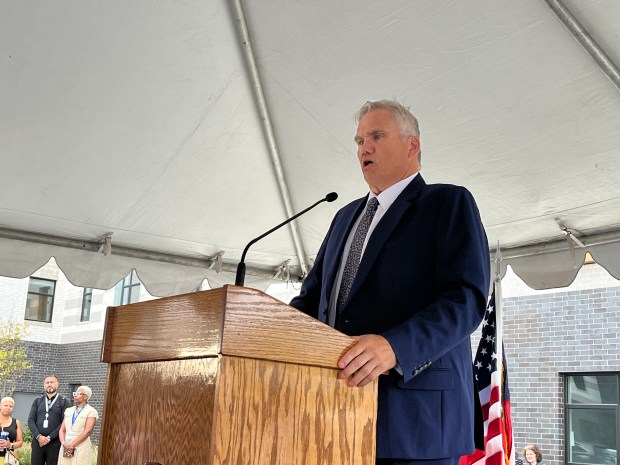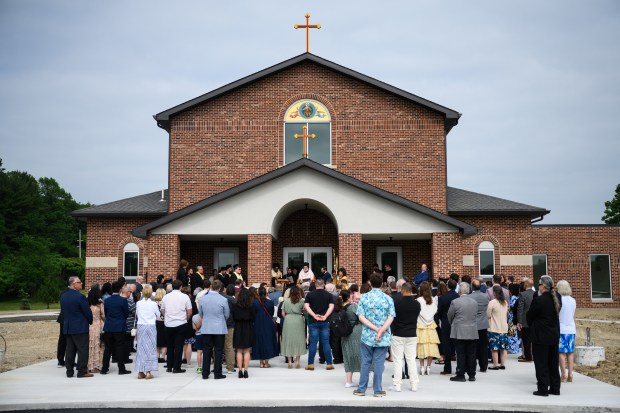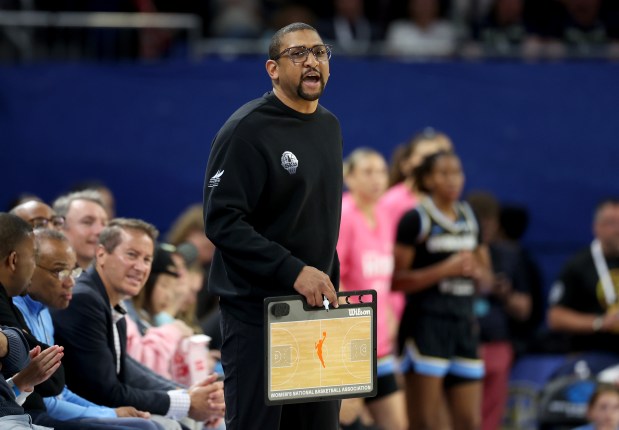Nearly 100 veterans, elected officials and housing authority representatives gathered Friday in Chicago Heights to celebrate the opening of Otto Veterans Square, an 82-unit affordable housing complex for veterans experiencing homelessness.
The Cook County Housing Authority ribbon-cutting ceremony unveiled the development at 1440 Otto Boulevard, site of the former St. James Hospital. Richard Monocchio from the U.S. Department of Housing and Urban Development praised the event as a significant milestone in supporting veterans in need.
“We’ve had a disinvestment in housing, and that’s got to change. And it starts here. These are the heroes that we should be building for,” he said.
The four-story building features units ranging from 525 to 550 square feet, with each floor equipped with a laundry room. Amenities include a multi-purpose common area on the first floor, a media room, a conference room, a fitness center, a washing station for service animals, a secure dog park and an outdoor greenspace for tenants, which will be completed in the coming months.
All apartment units will receive rent subsidies from the housing authority, with rents adjusted on a sliding scale to ensure residents pay no more than 30% of their income on housing, Monocchio said. With policy changes in August, veterans will have an easier time qualifying for affordable housing, he said.
Previously, public housing agencies administering the Veteran Affairs Supportive Housing program only had to admit residents with incomes at or below 50% of the area median income. The new policy sets the income eligibility threshold for veterans to 80% of the area’s median.
“Veterans with relatively higher incomes but still in need of affordable housing can now access facilities like this,” Monocchio said.
Veterans receiving benefits due to injuries or illnesses incurred during military service faced additional housing affordability challenges. Before HUD revised the policy, these injury related benefits were counted as income when determining eligibility for certain housing programs.
As a result, some veterans found themselves exceeding the income threshold for these developments, Monocchio said.
Kristin Faust, executive director of the Illinois Housing Development Authority, said veterans make up a significant portion of the state’s unhoused population, with at least 500 veterans experiencing homelessness each night.
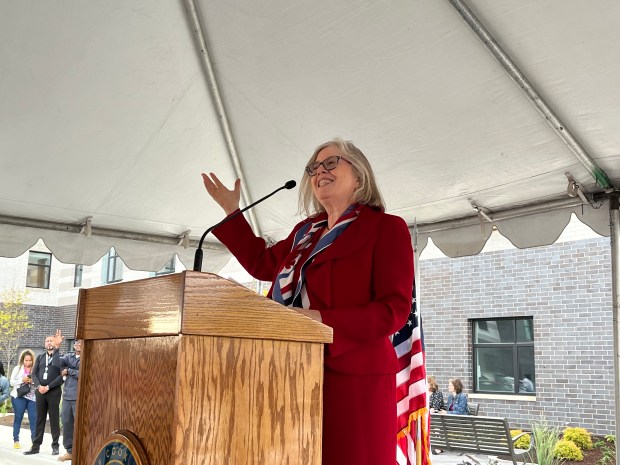
“Veterans have a higher rate of homelessness than other Americans, mostly because they’re more likely to originally come from disadvantaged backgrounds, but also because of service-related trauma,” Faust said.
Ermon Davis, a veteran who served in 1966, watched the ceremony with deep awe and gratitude. He marveled at the project, which he played a crucial role in bringing it to life.
Still, Davis said housing veterans remains a challenge. He said he has witnessed firsthand how some veterans, struggling to readjust after service, turn to drugs or other coping mechanisms.
To assist veterans with housing, you first have “got to get them in a frame of mind of coming inside and getting off the street,” he said. In Davis’ experience, this is the greatest barrier to providing veterans with the services they need.
Monocchio said participating in the veterans housing program is also appealing for landlords because, in the last two years, HUD has raised the fair market rent by 23%. For the veteran’s program, HUD will cover up to 140% of the market rent. He said HUD also helps to bring tenants to landlords and guarantees the payment of the first month’s rent.
“In some cases, municipalities and housing authorities will pay that first month’s rent, we’ll pay the security deposit and even give a landlord incentive,” he said.
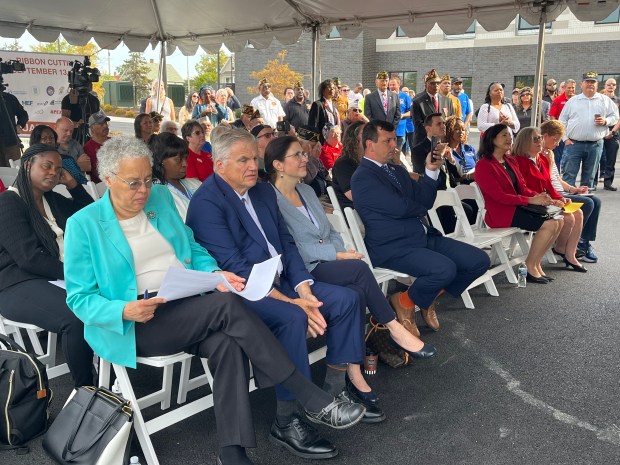
In August, HUD awarded $20 million in administrative fee funding to 245 public housing agencies across 43 states to support the veterans’ supportive housing program. This funding will enhance various aspects of the program, including expanding housing search assistance, boosting landlord recruitment, offering incentives and retention payments, assisting with security deposits and facilitating landlord-tenant mediation.
Monocchio said in his experience, many people have misconceptions about housing tenants under subsidy programs, often thinking there’s too much red tape involved. He said he has traveled the country to explain to housing authorities how the program will fit their business model.
After the ceremony, attendees were able to tour the facility and view a model unit along with the finished common spaces.
Cook County Board President Toni Preckwinkle said the housing development represents a significant step in revitalizing Chicago Heights and tackling homelessness in the Southland.
“Otto Veterans Square is more than just an affordable housing development. It’s a testament to our unwavering belief that housing is a human right,” Preckwinkle said. “We stand here today, and we’re reminded of the responsibility we have to ensure that everyone everyone has access to safe, dignified, supportive housing, especially our veterans.”
smoilanen@chicagotribune.com


